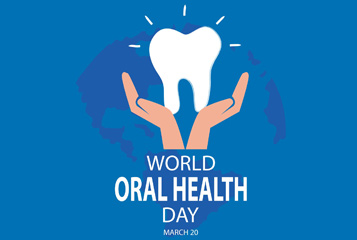A healthy mouth is important for a healthy body. It is very important to pay attention to your oral health as the mouth is one of the main doorways for the virus that can cause COVID-19 and other infections such as the flu. Adopting a good oral hygiene routine and managing risk factors is important to protect yourself and others. World Oral Health Day (WOHD) is celebrated every year on March 20 to raise awareness about these matters.
The largest global awareness campaign on oral health, WOHD is organized by the FDI World Dental Federation. The major goal of WOHD is to spread the message about good oral hygiene practices to adults and children alike and demonstrate the importance of optimal oral health in maintaining general health and well-being. Each year, WOHD focuses on a specific theme to reach out to the public, oral health professionals, and policy makers. This year, the official theme of the campaign is “Be Proud of Your Mouth”. This will be the theme for the next three years.
WOHD focuses on a specific theme each year and reaches out to the public, oral health professionals and policymakers who all have a role in addressing the consequences of oral disease. This year’s theme sends out a simple but powerful message “value and take care of it.” The campaign seeks to inspire change by focusing on the importance of oral health for overall health because good oral health can help you live a longer, healthier life, and that is something worth taking action for (worldoralhealthday.org).
Oral disease affects almost all people at some point during their lifetime. This occurs mainly due to the poor oral health. Oral diseases such as gum disease can increase your risk of serious health problems such as heart attack, stroke, poorly controlled diabetes, and more. Fortunately, most oral health diseases or conditions are preventable and can be treated in their early stages. Maintaining good oral and dental hygiene can reduce risk of gum disease, bad breath and tooth decay. It will also help you maintain good health as you get older.
FDI World Dental Federation has posted a fact sheet that discusses some effective tips you can adopt for practicing good oral health during the COVID-19 pandemic. They are:
- Practice a good oral hygiene routine:
a. Before brushing your teeth make sure you wash your hands with soap and water.
b. Use a fluoride toothpaste to brush for two minutes, twice a day.
c. If brushing is not possible, rinse with a fluoride mouthwash or chew sugar-free gum after meals and snacks instead.
d. Replace your toothbrush every three months, or immediately after you have been ill
e. Avoid sharing personal items with people who are ill
f. Floss at least once a day (never reuse floss and do not re-use interdental cleaners if you were ill). - Eat a well-balanced, low-sugar diet: Sugar is the number one cause of tooth decay (dental caries). During the COVID-19 pandemic, people are affected by stress and uncertainty, which in turn has impacted their food preferences and increased intake of foods high in sugar. For oral health:
a. Follow a well-balanced, low-sugar diet.
b. Eat plenty of fruit and vegetables
c. Adults should have no more than six teaspoons of sugar daily and, children three teaspoons.
d. Do not eat sugary snacks and treats between meals
e. Avoid sugary drinks, choose water as your main drink - Take charge of your oral health
a. Cut alcohol intake, as its acid and high sugar content can not only erode your teeth and cause tooth decay but also increase risk of several cancers, including cancers of the mouth, larynx, pharynx and oesophagus.
b. Quit smoking. Tobacco in any form is unsafe. It increases risk of gum disease and oral cancer. It also causes teeth staining, bad breath, premature tooth loss, and loss of taste and smell. - Consult your dentist: It’s important to get regular dental checkups. With the ongoing pandemic, this may be delayed. Call the dental practice and discuss whether you should postpone this appointment due to the crisis.
a. If you go to the dentist, follow the rules established by the dental clinic.
b. If possible, attend the appointment alone. Only children and dependants should be accompanied.
c. Practice physical distancing when you are in the dental clinic.
d. Depending on where you live, and if you need to visit the dentist, you must follow the national/ regional recommendations and contact the dentist for guidance if:- You have tested positive for COVID-19
- You have COVID-19 symptoms (dry cough, fever, shortness of breath, fatigue, muscle and joint pain, sore throat, headache)
- You live with someone or were in contact with someone with COVID-19.
e. Importantly, do not attempt to treat or relieve any dental problem by yourself. - Protect yourself and others:
a. Always remember the general rules to prevent the spread of COVID-19
b. Wash your hands with soap and water for at least 20 seconds or use hand sanitizer with at least 60% alcohol
c. Avoid touching your eyes, nose and mouth
d. Wear a mask, where recommended
e. Stay at home if your national or local policies require you to do so
f. Practice physical distancing and stay at least 2 meters away from other people
With a proper oral hygiene routine, regular dental check-ups, and a healthy lifestyle, you can protect your mouth and body.
This FDI World Dental Federation allows people to show their support for the campaign by using an online #MouthProud custom poster tool. This tool allows to place an ornate art frame over their mouths-as a symbol that they recognize just how significant and important the mouth is-and make a personal commitment to prioritize their oral health. So, get ready to be #MouthProud!
This World Oral health Day, take a pledge to maintain a strong and healthy mouth and inspire others to do the same!
